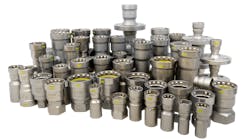This article is part of a three part series that takes a hard look at some of the business practices that have overrun the trades, including plumbing contractors. For better or worse, economic depression and the franchise model have affected the business model itself. Your grandfather wouldn’t recognize how service companies are run today. As eroding consumer trust and near panic level recruitment concerns come to forefront, we have to wonder how well these ‘best practices’ are working. The primary question that we pose in this series is whether the short-term profitability of these tactics is worth the long-term costs to the industry.
What it Means to be a Plumber
At some point being a tradesman stopped being worthy of our sons and daughters. The American dream means wanting better things for our children. Each generation paints a picture of what “better” means. At some point, a college degree became an uncompromising part of that picture along with an office job and banker’s hours.
Then college nearly got commoditized. College degrees lost some of their prestige and simultaneously decreased in value while increasing in price. We’ve painted a really expensive picture of what success looks like.
Meanwhile, skilled labor jobs go unfilled. Infrastructure is crumbling and employees in necessary service positions are stretched to the breaking point. Plumbers are just one of the trades that have become undesirable, but it might be the one that puts us at the highest risk.
Left unchecked, we are headed toward clean water and sanitation crises in our country. The reality of how these crises affect communities is evident around the globe and right here in America. Flint, Michigan, families spend thousands of dollars on bottled water each month because their city let unqualified people make critical decisions. Nearly the entirety of the southern hemisphere watched their children die in the hundreds of thousands each year — 10 million children over the past 15 years — due to lack of access to sanitation. That seems unfathomable in America.
While we tell our sons and daughters that being a plumber isn’t worthy of their life’s pursuit, Flint, Michigan, and sub-Saharan Africa would hail plumbers as true and literal heroes. The skills that we take for granted in America suddenly become a lifeline to those without clean water or a toilet to flush.
When we look at it that way, the opportunity to become a plumber is a privilege. It’s a job that has stable demand and increasing importance. To be a plumber is to save lives, it is to be a critical piece of civilization. It is a dangerous perception to believe that plumbers are unimportant or that the profession is an unworthy pursuit for our children.
What’s in a name?
In recent years the terms “plumber” and “technician” have become interchangeable. Some might argue that the difference is just semantics. Finding the origin of this term in the industry has proven difficult, however, there seems to be a consensus that it is an attempt to bring a level of professionalism to the trades.
This attitude, that we need to improve our standing in society, that we need to apologize for what we do, is a huge problem. Technician is a buzzword. It is meaningless. In fact, if you search the word technician on a job board, the results are downright depressing. The majority of these jobs, which are spread over dozens of industries, have menial pay and require no extensive training or certification. It’s a vanity title best suited for entry-level occupations.
We don’t need a buzzword on our business cards to justify our place in society. We need career plumbers who are licensed and can be relied on to perform the critical services that keep our children and elderly safe from disease and our water supply flowing.
How we got to a place where being a plumber was a pig on which we had to put lipstick shows a serious lack of global awareness.
The term technician is too often used in advertising and marketing to completely avoid the conversation of experience and licensure. There is no implied training level in the title technician and unscrupulous business owners are using it to cover their desperation for skilled employees. But rather than investing in training to create those skilled workers they call them a technician and throw anyone who has used a toilet auger into a truck. Sink or swim is not a training method.
If we, as an industry, don’t step up to train our next generation of plumbers, then we aren’t going to have one. Lack of pride and lack of training are pushing people out of the industry as fast as they come in. Employees who have dedicated their career to the plumbing trade, who have gotten licensed and keep up their education should be proud to call themselves plumbers.
Titles do matter
You could look at all of this as a pride issue. Let’s redefine what it means to be successful in this country. That might look something like having a well paying job and a healthy body. Plumbing would get two checks in the “yes” column for that one. We could define success as making an educational decision that doesn’t burden you with overwhelming debt for the following 20 years of your life. Again, check. We could even define success as doing a job that matters and that has a positive impact on society. Check, check.
How we got to a place where being a plumber was a pig on which we had to put lipstick shows a serious lack of global awareness. It is a slap in the face to every mother around the world that still has to deal with her child dying of dysentery because they fall into the one-third of the world's population that doesn’t have access to toilet facilities. It puts our children’s children at risk because they might not be able to find someone to clear a sewage backup or install plumbing to code 50 years from now.
All of this might sound overly dramatic but every bit of it is truth. The world health organization agrees that sanitation has saved more lives than medical doctors ever will. Plumbers are a vital piece of that puzzle. Let’s not forget that and let us move forward with our heads held high. Most of all, encourage young people to join our noble profession and call themselves plumbers too.


